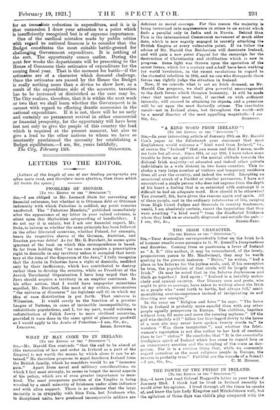THE IRISH CHARACTER.
[To THE EDITOR OF THE " SPECTATOR-"1 Sus, —Your Australian correspondent's letter on the Irish lack of humour recalls some passages in G. W. Russell's Imaginations and Reveries. Coming from so passionate a lover of Ireland as " A. E." (the author, it may be remembered, of the lovely, preposterous paean to Mr. MacSwiney), they may be worth quoting in the present instance. " Dante," he writes, " had a place in his Inferno for the joyless souls, and, if his conception be true, the population of that circle will be largely modern Irish." (It may be noted that in the Inferno Joylessness and Sloth go together.) And again : " Ireland is a horribly melan- choly and cynical country. Our literary men and poets, who ought to give us courage, have taken to writing about the Irish as a people who `went forth to battle, but always fell,' senti- mentalizing over-incompetence instead of invigorating us and directing our energies."
In the essay on " Religion and Love " he says: " The home life in Ireland is probably more squalid than with any other people equally prosperous in Europe. The children, begotten without love, fill more and more the teeming asylums." Of the girl who docilely will " follow her four-legged dowry to the house of a man she may never have spoken twenty words to," he wonders " Was there temptation "; and whether the Irish- woman's reputation is not duo rather to her lack of emotion than to her " virtue." He concludes that " It is the essentially irreligious spirit of Ireland which has come to regard love as an unnecessary emotion and the mingling of the sexes as dan- gerous. For it is a curious thing that, while we commonly regard ourselves as the most religious people in Europe, the reverse is probably true." Faithful are the wounds of a friend!


































 Previous page
Previous page